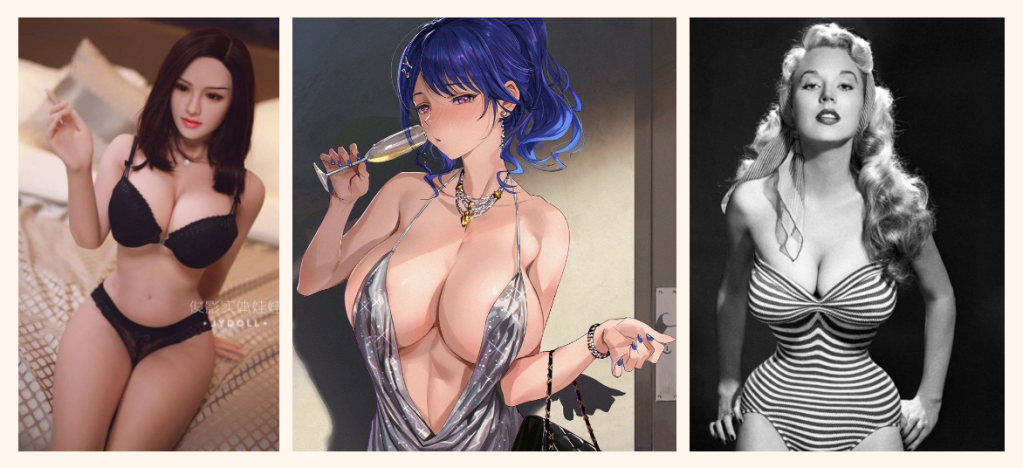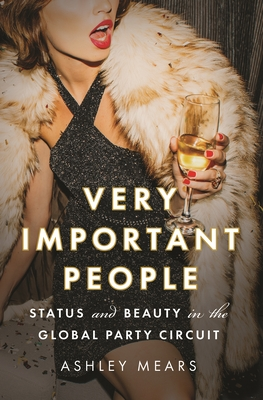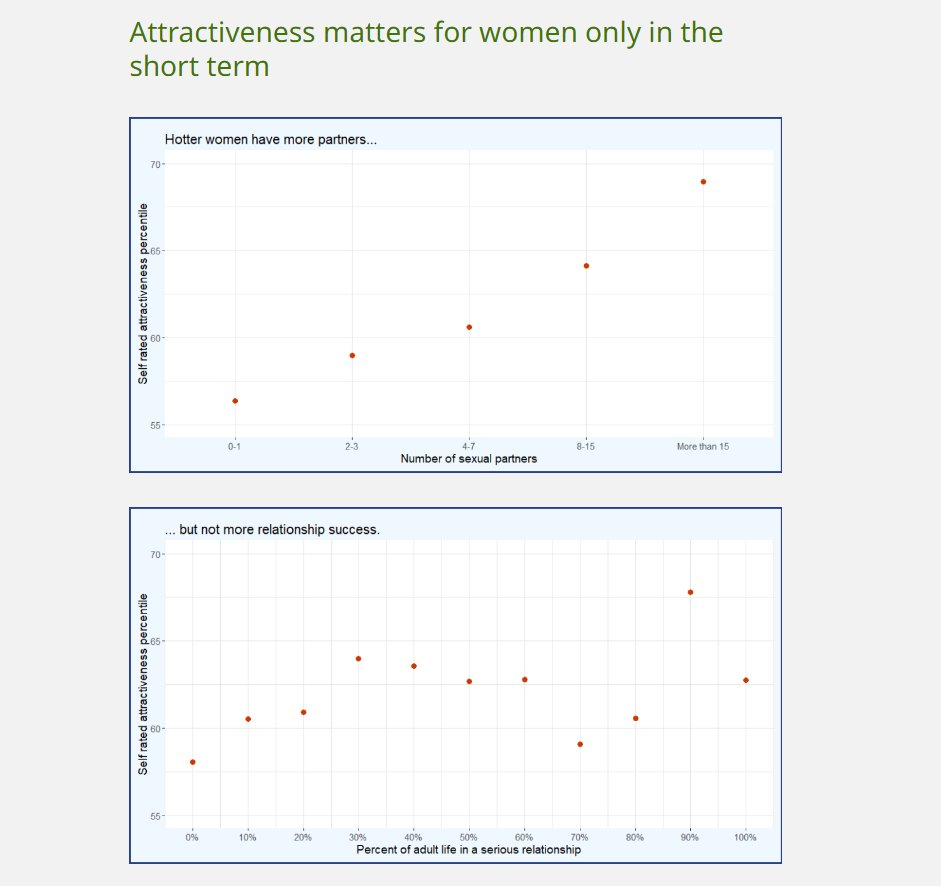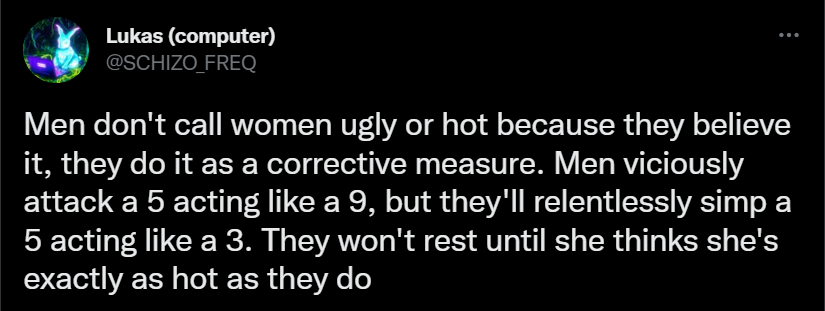Why Are Women Hot?
post by Jacob Falkovich (Jacobian) · 2022-12-18T23:20:38.638Z · LW · GW · 19 commentsContents
A Fat Bitch. What Could This Mean? Trickle-Down Beautinomics Standing There Looking Hot is not a Love Language Love is Love Until a 6 Dates an 8 Hot For Myself None 19 comments
Cross-posted, as always, from Putanumonit.
Why are women hot?
They just are is not an unreasonable answer, but it’s not like women are hot entirely by coincidence. Women put a lot of effort into their appearance. They care a great deal about their looks, as does everyone around them.
Why do women want to be hot?
The default answer: it’s sex appeal. Women are hot so that men will want to have sex with them. Men wanting to have sex with a woman results in her getting things she wants like companionship, resources, and even sex.
And it’s undeniable that men like having sex with hot women. Or at least, that they like imagining having sex with hot women. Although actually, the sort of women that men imagine having sex with the most is not the sort that most men describe as beautiful, which also isn’t who they marry, which itself isn’t the look that most women are trying to achieve. Taking a careful look at men looking at women, whether they be ancient sculptors or club VIPs or Tinder matches, reveals that something is missing with the default answer.
There is more to female beauty than meets the eye of the male beholder.
A Fat Bitch. What Could This Mean?
A good place to start our investigation of female beauty is Dispelling Beauty Lies: The Truth About Feminine Beauty by an evil vizier in charge of the sultan’s harem. What lies does it dispel?
Vizier notes that models advertising fashion are often not very beautiful. Heroin chic mannequins picked by gay male designers for the catwalk or “body positivity” models cast to align the brand with a political message, neither of those are maximally attractive to the majority of men. Simply asking men what they find beautiful is also fallible, with several reasons listed for both men and women to lie in public about whom they find beautiful. Only revealed preference is to be trusted.
Men’s preferences reveal a lot. Noticing a striking convergence between ancient statues of love goddesses from Minos to the Indus, “odalisque” paintings commissioned by Romantic era aristocrats, Japanese anime waifus, bestselling sex dolls, and the modern American’s porn browsing history Vizier arrives at the following timeless and universal list:
- hourglass figure with a tiny waist-to-hip ratio
- round “bubble” butts
- big boobs. way bigger than you’d think. still bigger. we’re talking really huge
- not too thin, but thinner than the average woman today
- youthful features
- long hair
Vizier admits to two caveats. First is that tastes do differ among men, at least in their relative emphasis on the traits listed above. I remember, having just taken a class on market segmentation, seeing a group of three young women of about equal overall attractiveness. One girl with great boobs wore a top with deep cleavage, a long-legged skinny girl wore a mini-skirt, and the girl with the prettiest face wore conservative clothes and tasteful makeup. I predict that this group of girls, intuitively sensing what professors have to painstakingly explain to business students, do much better by appealing to boob guys, leg guys, and face guys respectively than if they all went for the same “universal standard”.
But the bigger issue for Vizier’s theory is that women want to marry high status, rich, upper class men. And these men seem to marry on the other side of the curviness curve than what Vizier’s analysis would predict. Whoever these men may jerk off to in private, if you walk into any luxury restaurant (or just google the wives of CEOs, or even top-billed Hollywood actresses) you’d be hard pressed to spot a single pair of DDs in the crowd.
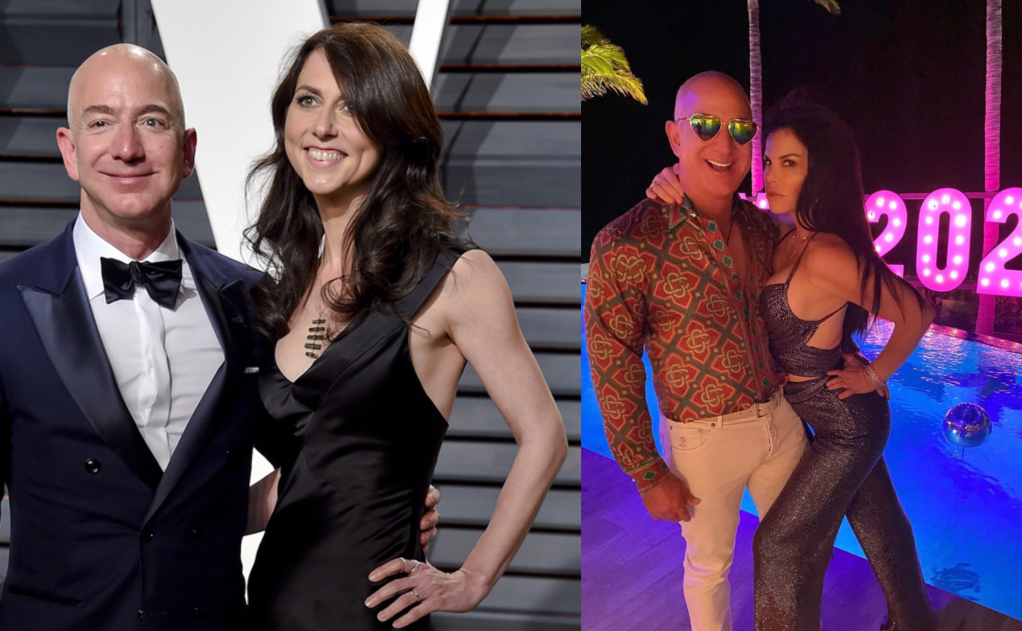 Supplementing testosterone and ascending beyond competition do seem to drastically move one’s taste to Vizier’s ideal, N=1
Supplementing testosterone and ascending beyond competition do seem to drastically move one’s taste to Vizier’s ideal, N=1
Vizier claims that upper-class men in the pursuit of social status have brainwashed themselves into denying their true desire for voluptuousness. This begs the question, why would svelte body types be high status? After all, vizier himself notes that hourglass figures with giant boobs are much rarer, and scarcity is valuable. Instead, upper class preference for skinny, endurance-athlete body types may serve as a proxy for important traits such as discipline and low time preference, good health, and attunement to elite norms. It is also a body type that may age better for a class that expects long-lasting marriages.
On the opposite end of the income distribution, we often find the opposite taste in women:
This question is particularly funny coming from Dawkins since an evolutionary explanation presents itself readily. But still, the style female beauty that men recognize and women aspire to that seems very much dependent on social class, and quite removed from the common sex appeal denominator.
So far we can conclude: women’s looks aren’t optimized for instinctual sex appeal, but perhaps for more complicated signaling related to dating. Since people want to date within their class and culture, relationship-oriented beauty standards involve a lot of social signaling and not just Vizier’s ideal of universal sexiness.
And why would a socialized standard of beauty be any less real or meaningful than a presumably more “natural” standard tied to raw horniness? We learn an aesthetic appreciation of things like art, architecture, and even nature by observing the preferences of others and cultivating discernment. A woman’s beauty is visible to everyone at once, not just a single man in isolation. It is very natural to intuitively know and care what everyone around you finds attractive.
Trickle-Down Beautinomics
At the very pinnacle of female beauty and male power, however, we find even stranger things. For example: the VIP club scene, recounted in the fantastic Very Important People: Status and Beauty in the Global Party Circuit by model-turned-sociology professor Ashley Mears.
Models-and-bottles clubs work like this: very rich but not very famous men spend tens of thousands of dollars on champagne bottles they don’t actually drink, sitting at tables that just happen to be surrounded (or surmounted) by ‘girls’. The girls are a very specific flavor of beautiful: very thin, extremely tall, usually white. To ensure the girls’ presence the clubs pay a cut to promoters, who are good looking and charismatic young men of modest means and varying ethnicities. The promoters in turn never pay the girls in cash but rather provide favors like driving the girls around during the day and free entertainment at nighttime.
There are two important components of this setup. First are the several layers of semi-transactional intermediation that separate the rich men, who never pay for girls directly, and the beautiful girls themselves, who are never paid at all. Everyone in the club is just having a good time with friends, no one is explicitly buying or selling beauty.
The other crucial aspect is that the rich men very rarely have sex with the club girls; this is declassé for the gentlemen and reputationally ruinous for the ladies — enough to get a girl blacklisted at the top clubs. They rarely even talk to the girls (the music is generally much too loud, or they’re engaged in conversation with other important men). And they never ever marry the party girls, tending to date exclusively within their narrow elite circles.
The role of party girls in the VIP club is simply to confer status on the man at whose table they’re dancing, along with the number of empty bottles of Dom Pérignon on display. Even if the man in question prefers short and curvy Latinas, tall (and thus both rare and highly visible) skinny white models are simply the currency of the dick-measuring wealth-incinerating potlatch of the club party. Wastefulness, of both the champagne sprayed on the floor and the beautiful models conspicuously ignored, is the entire point.
And what benefit do the girls themselves get? Mears says that many of them start off hoping to snare a rich husband, stay in the game for their love of partying and connection with the promoters and fellow girls, and ultimately admit that the mere proximity to powerful men is the draw in itself, the seductive glow of reflected status.
Standing There Looking Hot is not a Love Language
Women’s beauty conferring status on men is not limited to the world of models and millionaire playboys. Men are keenly aware of hierarchies, and the relative ranking of the hotness of each man’s girl is a big one. The best jewelry for a man is the one worn by the beautiful woman on his arm.
But the flipside of this is that a woman’s beauty matters most to a man who is most insecure about his status, and least to a man surrounded by good friends who know his worth. And in general, a man obsessed primarily with his girlfriend’s looks is not the most reliable partner, especially not in the long term.
If we think of the pursuit of happy relationship for a woman as a funnel from a large number of potential suitors to a single, dedicated husband, a girl’s looks help mostly in the early stages of it. Beauty converts a glance into a long look, and a smile into a first date. But most young women don’t lack for male gazes and first dates, the issue they more often complain about is converting short flings into lasting relationships. Hot girls get more than enough attention, and not enough dedication.
Hotness just doesn’t have much to do with the latter. Beauty fades with age and gets accustomed to with familiarity. Relationships that last are built on things that last.
The best book of dating advice for men I know is Mate: Become the Men Women Want. It talks about building and demonstrating competencies all along the funnel, from a dress style that flatters and conveys an aesthetic sense to work habits that show you will be a capable father to a woman’s children. When I read it I immediately started looking for an equally good book of advice for women. It’s not that I haven’t found a good one — the entire genre seems entirely nonexistent.
All dating advice for women comes in four flavors:
- How to be hot
- How to not be insecure
- How to select men to date
- Lunatic femcel ravings
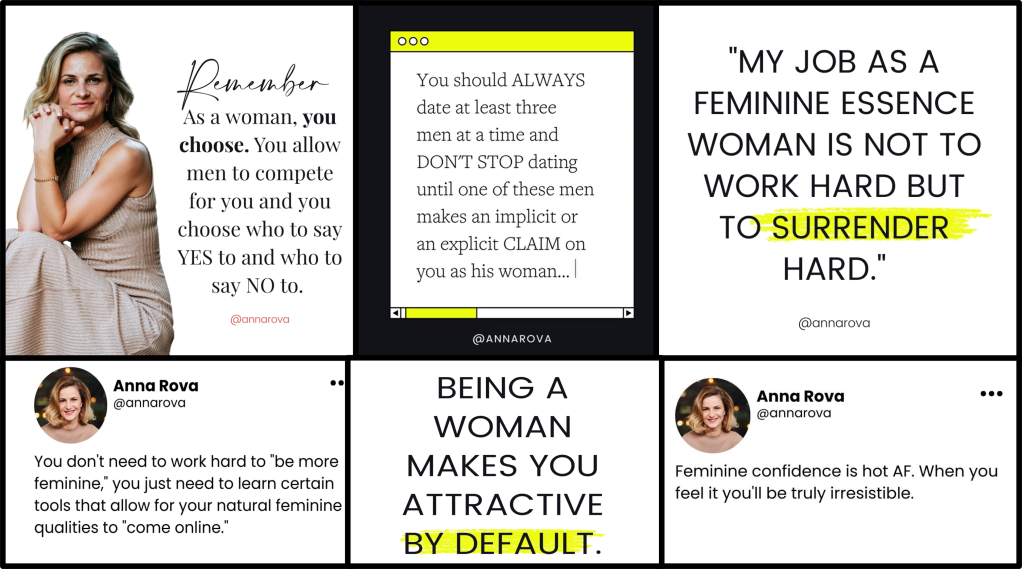 This female dating coach was recommended by my friend after years of searching
This female dating coach was recommended by my friend after years of searching
There is almost no advice for a girl on how to actively contribute to a relationship, or that it’s even a goal. Back in the day on OkCupid I’ve had several matches where I would make a few jokes or observations and the girl would respond “haha” or "lol" every time at which point I would unmatch because if you can’t contribute two words to a conversations then what exactly are you going to contribute?
Women who are excellent lovers, girlfriends, and wives presumably pick up these skills in private from relatives and friends and from life experience. But there is almost a universal pact to prevent any of this from becoming part of mainstream culture. The progressive view on gender believes in education, but that it should be directed towards “feminist” goals of career advancement and self-fulfillment independent of men. The conservative view stresses nature over nurture, and is much less influential in the mainstream culture young women are exposed to anyway.
Women without both the knowhow and expectation of having active relationship skills are more susceptible to the vicious spiral of narcissistic self-improvement. They acquire more and more markers of socially-sanctioned desirability like credentials and competitive achievements while simultaneously getting harder to date and worse at the work of relationships.
And again: beauty by itself is not the work of relationships. Just standing there and looking hot is not a love language. It’s what impresses everyone except for your current partner.
Research seems to bear this out. Looks are a major driver of getting matches on dating apps but have zero predictive power for relationship satisfaction. In my own research, hotter women reported more lifetime sexual partners but were not any more likely to be in long-term relationships.
Hotter women seem to use all the extra selective power they gain from their beauty on dating hotter* men. They use none of it on finding men who are kinder, smarter, more loyal, more emotionally stable, or harder working. It’s remarkable how little women’s hotness correlates with any measure of long-term relationship success or happiness.
* It’s more accurate for men to talk of “high SMV” as opposed to just hotness. Sexual Market Value is commonly understood as immediate/superficial attractiveness to members of the opposite sex. It’s the thing that people actually “rate on a 1-10 scale”; note that the scale is used for strangers/celebrities, not people you’re in a relationship with. For men SMV includes other outwardly impressive traits like height and the impression of status and money, for women it’s mostly beauty and youth.
Love is Love Until a 6 Dates an 8
To recap: we started from the hypothesis that women evolved hotness to sexually appeal to men, but the standards of beauty women pursue diverge a lot from what most men find sexiest. This divergence make sense if women optimized for long term relationships as opposed to casual sex, but hotter women aren’t happier in love. A girl investing in her looks is focusing on the wrong part of the relationship funnel and optimizing for the short-term instead of the long-term. Women’s beauty confers status on men in their proximity, but confers little to the women themselves aside from the opportunity to pursue equally happy/unhappy relationships just with hotter men.
So what’s going on here?
One huge thing that isn’t talked about enough is what I call SMV compliance enforcement. Lukas explains:
This is completely true, all the time, for both sexes. Women will talk about how attractive they find a shy nerd with a dad bod, but call him an entitled creep if he dares to flirt “out of his league”. When Aella tweeted some qualifications of men she is interested in meeting, the responses she got weren’t about whether this standard is wise or not, but that her SMV is too low to publicly express such a standard.
I think that perhaps the biggest difference between Rationalist culture and mainstream culture is the degree to which people are attuned to others “rising above their station”, to monitor and slap them down. If people assign someone a particular level of status, they will react with immediate violence to that person acting as if they are of a higher level, or even merely wanting or planning to ascend in status. People demand a “status license” of anyone acting important or authoritative, of anyone expressing certainty on any topic, and of anyone admitting to any strong desire. Rationalists are aware of this impulse; most everyone else is so constantly consumed by it they don’t even notice it.
This status compliance enforcement happens in all domains, but doubly so in dating — perhaps fueled by the fact that most other “judgments” of other people’s sexual and romantic pursuits are now taboo to express. Everyone is all “don’t kink shame” and “the heart wants what it wants” and “love is love” until they see a 6 date an 8. The other condemnation that is socially acceptable to express in the romantic realm is of men flirting with younger women (GROOMER!), which is really just the same SMV compliance enforcement.
 Apparently this photo “maximizes engagement”, which is another way of saying that it makes a lot of people irrationally mad
Apparently this photo “maximizes engagement”, which is another way of saying that it makes a lot of people irrationally mad
I think this is the main reason that hot people spend all their selection power on hotness. It’s also a big reason why so many previously-happy marriages quickly dissolve when the husband loses his job or the wife gains some weight. The judgment of SMV noncompliance shows in every glance from a stranger, every remark from your aunt and every comment on the couple’s photo on social media. This becomes unbearable for all but the most blissfully ignorant autists.
Hot For Myself
Wait, we forgot to ask women. So, women, why do you care to be hot? Why are you putting all this time, effort, and money into following fashion trends, applying make up, stumbling in stilettos, plastic surgery, dieting, skincare made from the mucous slime of snails…
And lo, the women repliedeth: we are dressing up for ourselves, not for men.
What a twist! All this time we spent analyzing sex goddesses and champagne clubs and marriage statistics, and it turns out women were externally beautiful solely for internal consumption.
But yeah, I think this is true. We already established that men will happily have sex with women who aren’t optimizing for sexiness, and date women who aren’t the most sexually desirable, and persist in long-term relationships independent of the woman’s looks, and will care about their woman’s beauty in large part to the extent that they care about its effects their status in the hierarchy of men. And so my answer to the original question is:
Women are hot to see themselves, through the internalized standards of society’s judgment, as worthy of their relationships and their happiness.
Women are more socially attuned than men, and are aware of both men’s judgment of the man they’re with and of women’s judgment of themselves, both based first and usually foremost on their looks. A woman who doesn’t feel beautiful experiences a world where women may steal her man, and men diminish him. A beautiful woman feels secure and worthy through the status she confers on her mate, enough so that no female dating advice expects her to exert much additional effort.
I think that these judgments and perceptions are so ancient and universal that they are deeply internalized; a woman’s drive to see herself as beautiful doesn’t depend on whether her society or her man expresses them openly. Everyone pays fine attention to what others find beautiful or high status, no one pays much attention to what others claim about the importance of status and beauty.
Of course no simple answer can be the entire answer to a question such as this, and it surely rings true for some women and misses the point entirely for others. I am but a man, neither handsome nor hideous, mostly just curious. After decades of appreciating female beauty from the outside I tried to think of what the experience and pursuit of beauty would feel like from the inside, as a woman. And I noticed so many things that didn’t make sense about the obvious answer, so many strange phenomena around female beauty that didn’t fit.
So after thinking about this for months I think I have reached some understanding of the mysterious feminine; only the remaining 99.3% are still a mystery to me.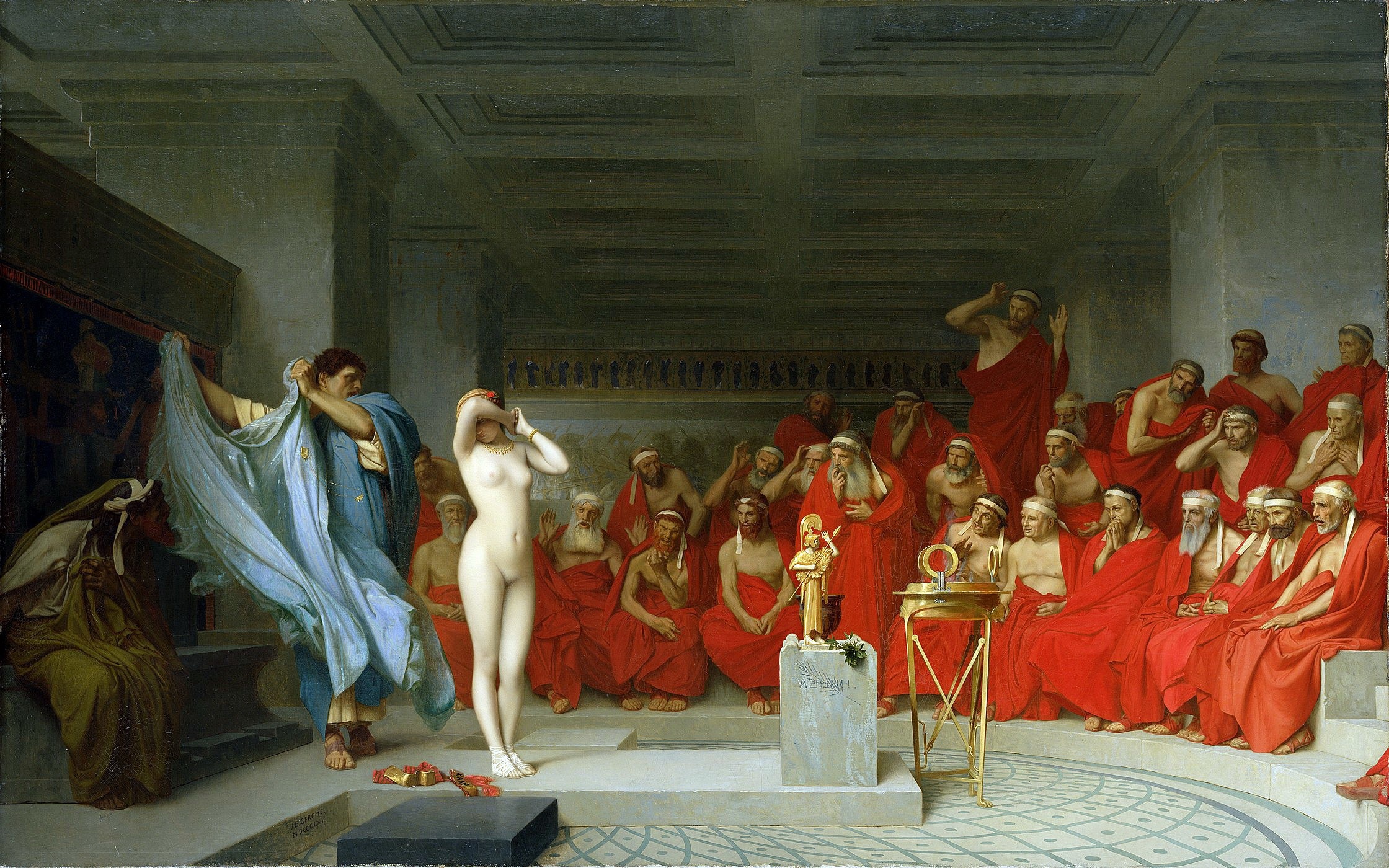
19 comments
Comments sorted by top scores.
comment by mingyuan · 2022-12-20T07:15:00.218Z · LW(p) · GW(p)
Thanks for the last section because that's totally what I was going to comment while reading the rest of it! Feminine beauty standards are so deeply internalized that they don't subjectively feel like they have anything to do with men or dating — they feel closer to, like, moral truths? Or something?
Like, I'm afraid of gaining weight not because I think it would be bad for my health or make my husband stop liking me, but because I've internalized the message that being fat is an unacceptable moral failing — and I've felt this way since at least the beginning of puberty, even though I never dated anyone until I was 21, and don't date much in general or have much interest in it. My sister feels this way and she's a lesbian who has never had any interest in dating anyone in her life. I feel better and happier when I'm wearing a pretty dress and have taken good care of my skin. I like putting on makeup despite the fact that my husband actively dislikes it (as have some other men I've lived with, but at least my husband is nice about it). Why any of this? idk tbh
comment by tcheasdfjkl · 2023-01-19T16:34:41.881Z · LW(p) · GW(p)
This post is a weird experience. It makes mostly reasonable claims but it's aggressively objectifying-male-gaze-y in a really unpleasant way and I strongly feel that content with that property should not be on LW without at minimum content warnings to that effect (which in this case would, uh, need to come before the title somehow) but preferably at all.
(Trying to say more about that intuition:
- it feels like it assumes the audience will be male (and having LW contain posts that are assumed-male-audience feels quite Unwelcoming (this word is overused but I think this is centrally what it's for))
- it feels like it sticks the reader straight into an objectifying frame without warning; I think warning/consent to engage with this frame is somewhat necessary here)
I think this problem might be largely due to automatic crossposting? I think it's, like, okay for blogs with these properties to exist in the world (though I don't want to read them) and I expect the blog itself provides enough "content warning" through context. But pulling the post onto LW by default seems bad.
I think ozy has written posts I've liked where they said a lot of similar stuff in a less intensely annoying way.
Replies from: Jacobian, Tego↑ comment by Jacob Falkovich (Jacobian) · 2023-02-01T20:54:23.105Z · LW(p) · GW(p)
I understand where you're coming from, but I think that norms about e.g. warning people about writing from an objectionable frame only makes sense for personal blogs and it's not a very reasonable expectation for a forum like LessWrong. These things are always very subjective (the three women I sent this post to for review certainly didn't feel that it assumed a male audience!). While a single author can create a shared expectation of what they mean by e.g. "warning: sexualizing" with their readers I don't think a whole community can or should try to formalize this as a norm.
Which means that it's on the reader to look out for themselves. I'm not going to put content warnings on my writing, but if you decide based on this post that you will not read anything written by me that's tagged "sex and gender" that's fair.
comment by Tego · 2022-12-19T22:58:37.259Z · LW(p) · GW(p)
I read Putanumonit somewhat frequently and and generally enjoy your writing, so I was surprised how much this essay made me automatically bristle.
As one generic critique: I disagree with the "Standing There Looking Hot is not a Love Language" section, exemplified this quote:
There is almost no advice for a girl on how to actively contribute to a relationship, or that it’s even a goal.
This seems very obviously incorrect. Googling "how to make boyfriend happy" brings up a lot of articles about showing trust, making romantic gestures, giving compliments, doing extra chores, etc. There are also the perennial arguments about how most women do more housework and childwork. It's possible I'm misunderstanding the thrust of this argument somehow, but it genuinely confuses me.
I have vague negative feelings about some other pieces, but I imagine any other nitpicks would be more likely to be motivated reasoning than useful commentary.
In any case, this piece generally seems well written, and I really do usually enjoy your writing. This is a useful self-prompt in trying to figure out why my emotions are mismatched with my reasoning.
Replies from: Jacobian, Viliam↑ comment by Jacob Falkovich (Jacobian) · 2022-12-20T16:12:02.288Z · LW(p) · GW(p)
This seems very obviously incorrect. Googling "how to make boyfriend happy" brings up a lot of articles about showing trust, making romantic gestures, giving compliments, doing extra chores, etc.
That's true, but I think this sort of thing isn't usually given as "dating advice" for women and many would bristle at the suggestion that the girl has to do and practice all those things to find a happy relationship. A girl who's googling "how to make boyfriend happy" instead of "how to get boyfriend" is already on the right track.
And again, I'm not saying that women don't contribute to relationships or marriages — they clearly do and you can make the fair argument that it's more than 50% on average. I'm saying that they don't signal their abilities and willingness to contribute in the early phases of mating and courting, and all advice about how to find a boyfriend doesn't talk about that at all.
↑ comment by Tego · 2022-12-21T00:23:55.782Z · LW(p) · GW(p)
So everyone has approximately the same optimal strategy for creating a healthy & stable long-term partnership. But in the process of finding partners, women optimize more for attractiveness, because physical attractiveness matters more as a selection criteria for men, whereas women traditionally are looking more for traits like success and commitment. Is this more correct? I feel like that does address my objection above.
[Edit: from the following quote: "Women who are excellent lovers, girlfriends, and wives presumably pick up these skills in private [...] there is almost a universal pact to prevent any of this from becoming part of mainstream culture." This quote makes it look like you really did mean that women in relationships also have no info on being good partners, not just during the searching phase. It seems like the only evidence you present is that you couldn't find any books on how to be a good wife, which do seem to exist, even ignoring that all the best books like Nonviolent Communication are completely gender neutral.]
Some of the problem could just be in how the market is structured. Whenever I've gotten lame answers to messages on dating apps (short self-focused responses with no questions in return), my default assumption is not that the women aren't taught how to have interesting conversations / don't know how to contribute to starting a relationship, but more that they have many, many matches and I have fewer, so they can afford to be lame conversationalists and only go out with the guys willing to sweat over prolonging a dry conversation.
Something about my model of the situation must be deeply confused, because if both of the charts you include are accurate, I don't see why women would bother spending time on hair/makeup/whatever. It seems like all >=20th percentile women have an easy enough time getting matches, and if higher attractiveness doesn't lead to more fulfillment in relationships, why not just not bother too much with that part and then spend more time enjoying whatever matches you do get?
Anyway, thank you for the post and the reply. Apologies if I'm talking past you; something about this topic in particular is making me notice a lot of confusion, and I'm no longer sure to what extent I'm properly moored in your original argument.
↑ comment by Viliam · 2022-12-20T15:53:24.194Z · LW(p) · GW(p)
This seems very obviously incorrect. Googling "how to make boyfriend happy" brings up a lot of articles about showing trust, making romantic gestures, giving compliments, doing extra chores, etc.
Just guessing -- internet is large enough that you can find almost anything if you google it. But how likely are women to encounter such advice without actively looking for it? Does the culture bring the possibility of this behavior to anyone's attention?
There are also the perennial arguments about how most women do more housework and childwork.
That is indeed an important work, but it is not the same thing. One can do the dishes and help the kids do their homework, while completely ignoring their partner. (Technically, one can do the dishes and help the kids do their homework without having a partner at all.)
Imagine it from the opposite perspective: if a woman is complaining that her husband is not actively contributing to their relationship, and the husband says "but I bring to our home my salary!", does it seem like he has sufficiently addressed the complaint? Well, neither does "but I do more housework!".
Replies from: Tego↑ comment by Tego · 2022-12-21T00:33:53.989Z · LW(p) · GW(p)
It seems to me unlikely that women don't care at all about making their partners happy, and I'd argue that the google search is approximately the same level of evidence as the existence of the "female dating coach" in the original post.
You're definitely right on housework not being the same thing as investing in a relationship. That was my bad.
It feels like women do an equal amount of the work in emotional support / close connection / engagement / etc realms (at least once already in a relationship), but a cursory search on JSTOR hasn't turned up anything useful as far as proof, and I guess it's possible that I've just been very lucky in relationships so far.
comment by Vanessa Kosoy (vanessa-kosoy) · 2022-12-20T10:17:40.465Z · LW(p) · GW(p)
Personally, I feel that I want to be pretty as a goal in itself and in order to be attractive to straight men (and to other gynosexual people). I suspect women[1] have an evolved intrinsic desire to look pretty because in the ancestral environment it increased your genetic fitness to look pretty. To give an analogy, we eat both because (i) we are hungry and also food tastes good, and because (ii) we know we need to eat to survive (e.g. if you're sick and have no appetite you sometimes force yourself to eat) and we need particular types of food to stay healthy. A single activity can be motivated by a mixture of terminal and instrumental goals.
And other genders too, but for women it's more pronounced, on average. ↩︎
↑ comment by the gears to ascension (lahwran) · 2022-12-22T09:47:10.392Z · LW(p) · GW(p)
I am just not buying this argument that men do not have an equivalently strong drive to be handsome
comment by the gears to ascension (lahwran) · 2022-12-20T06:59:27.963Z · LW(p) · GW(p)
I feel like there's something confused about this. Plenty of men are intentionally hot. Why does your analysis focus specifically on women? what warranted privileging that hypothesis?
Replies from: jaspax↑ comment by jaspax · 2022-12-20T12:55:24.996Z · LW(p) · GW(p)
Probably because Putanumonit is straight. It's not that mysterious.
Replies from: lahwran↑ comment by the gears to ascension (lahwran) · 2022-12-20T20:46:34.770Z · LW(p) · GW(p)
that seems like it confuses the analysis though and some of these things seem like rationalizing being attracted to people in the first place. like, a lot of these things are real, but it sounds more like maybe the question is, under what conditions am I attracted to the people to whom I am attracted? and this advice all applies just as much to men.
comment by Lao Mein (derpherpize) · 2022-12-19T12:59:57.802Z · LW(p) · GW(p)
Maybe you're getting the causality wrong. Rich men prefer athletic and skinny women because those women were in their peer group where they were younger and were thus the most likely to be their partners. DD+ breasts are common in the US only because obesity is common. I just don't see there being a conspiracy of rich men secretly hiding their desire for large breasts.
Jeff Bezos is a bad example here. He's obviously blown out. He's balding, sad, and clearly compensating for something with steroids. It's like taking Marilyn Monroe as being representative of upper-class women.
Replies from: benjaminikuta, Fuzbol↑ comment by benjaminikuta · 2022-12-19T18:01:10.217Z · LW(p) · GW(p)
How can you tell he's sad?
↑ comment by Fuzbol · 2023-01-17T21:58:56.323Z · LW(p) · GW(p)
The parts about hourglass figures and waist-to-hip ratio, and the part where bountiful bosoms appear to be idolized in prehistoric goddess figures from the age of survival-calorie paleo-diets, as well as pornographic illustrations from famously low-obesity nations, would contradict the notion that “childhood exposure to obese figures with technically large cup sizes is what makes maximal fantasy breast sizes maximally horny”.
comment by Czynski (JacobKopczynski) · 2023-01-05T17:09:27.762Z · LW(p) · GW(p)
This is basically just standard evopsych nonsense. Why did you think this was worth writing?
Replies from: None